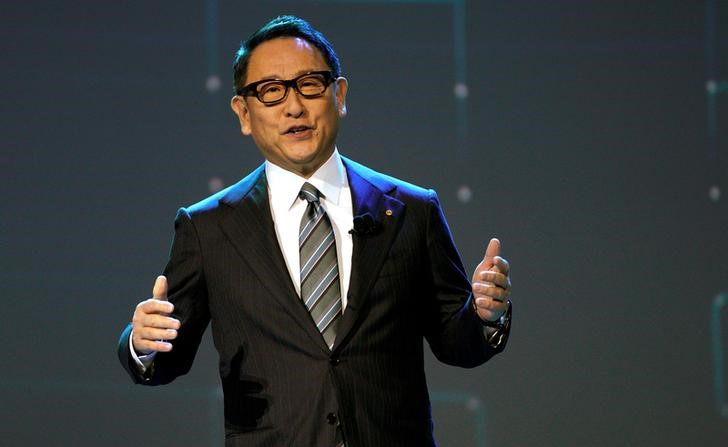 © Reuters. FILE PHOTO: Akio Toyoda, president of Toyota Motor Corporation, announces the “e-Palette”, a new fully self-driving electric concept vehicle, in Las Vegas
© Reuters. FILE PHOTO: Akio Toyoda, president of Toyota Motor Corporation, announces the “e-Palette”, a new fully self-driving electric concept vehicle, in Las VegasTOKYO (Reuters) – Japan’s automakers’ association said on Thursday it hoped that the North American Free Trade Agreement (NAFTA) would maintain its current framework as the United States, Canada and Mexico update the trade pact amid growing trade tensions between the United States and its trading partners.
“Japanese automakers’ businesses in North America are based on the NAFTA framework, and that framework is based on a three-party agreement,” said Akio Toyoda, chairman of the Japan Automobile Manufacturers Association (JAMA) and president of Toyota Motor Corp (T:).
“We hope that framework continues this way, and that it remains well-balanced.”
Japanese automakers are bracing for the possibility of higher tariffs on the vehicles they ship for the U.S. market after Washington earlier this year launched a national security investigation into car and truck imports.
They are also awaiting an agreement on a renegotiated NAFTA, which may come in coming weeks. Both issues could raise the cost of selling cars, one of Japan’s biggest export earners, in the United States.
The United States has wrapped up a side deal with Mexico and is threatening to exclude Canada if necessary. Canadian officials say they do not believe the U.S. Congress would agree to turn NAFTA into a bilateral treaty.
Most of Japan’s major automakers operate plants in the United States. At least half of the cars and trucks sold in the country by Japan’s top three carmakers are made in the United States.
In a statement, the association said it was concerned that U.S. tariffs of up to 25 percent on vehicle imports on the grounds of national security could have an impact on the Japan’s auto production and supply chain.
A renegotiated NAFTA could also have an impact on Japanese automakers producing cars in the United States, Canada and Mexico, JAMA said.
Toyota, Nissan Motor Co (T:) and Honda Honda Motor co (T:) all build vehicles in the United States, and also produce in Mexico, while Toyota and Honda also operate plants in Canada.
Toyoda suggested the possibility that automakers embrace more localized production globally even as waning demand for cars at home clouds the outlook for the future of Japanese production. For years, a portion of Japan-produced cars have been exported overseas.
Japan’s government is hoping to avert additional, steep U.S. import tariffs on its cars and fend off U.S. demands for a bilateral free trade agreement at a second round of trade talks with Washington, likely to take place next week.
Fusion Media or anyone involved with Fusion Media will not accept any liability for loss or damage as a result of reliance on the information including data, quotes, charts and buy/sell signals contained within this website. Please be fully informed regarding the risks and costs associated with trading the financial markets, it is one of the riskiest investment forms possible.
Source: Investing.com




























